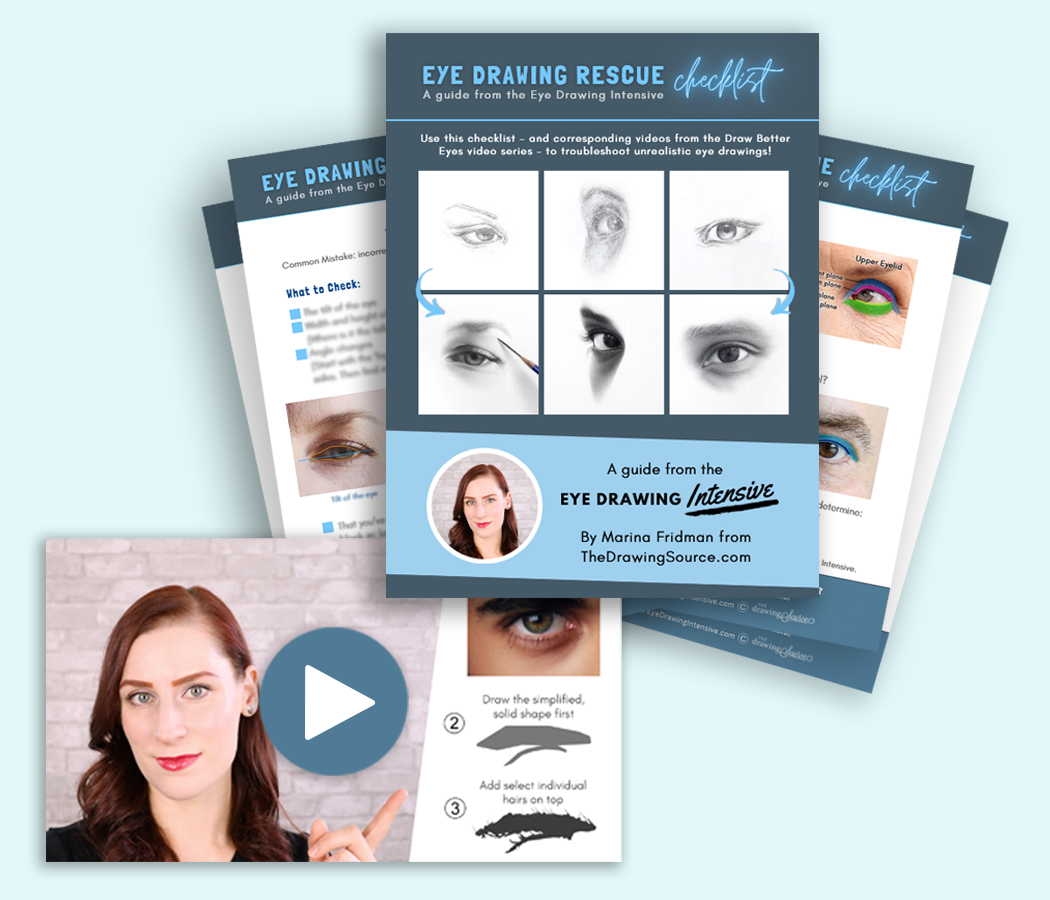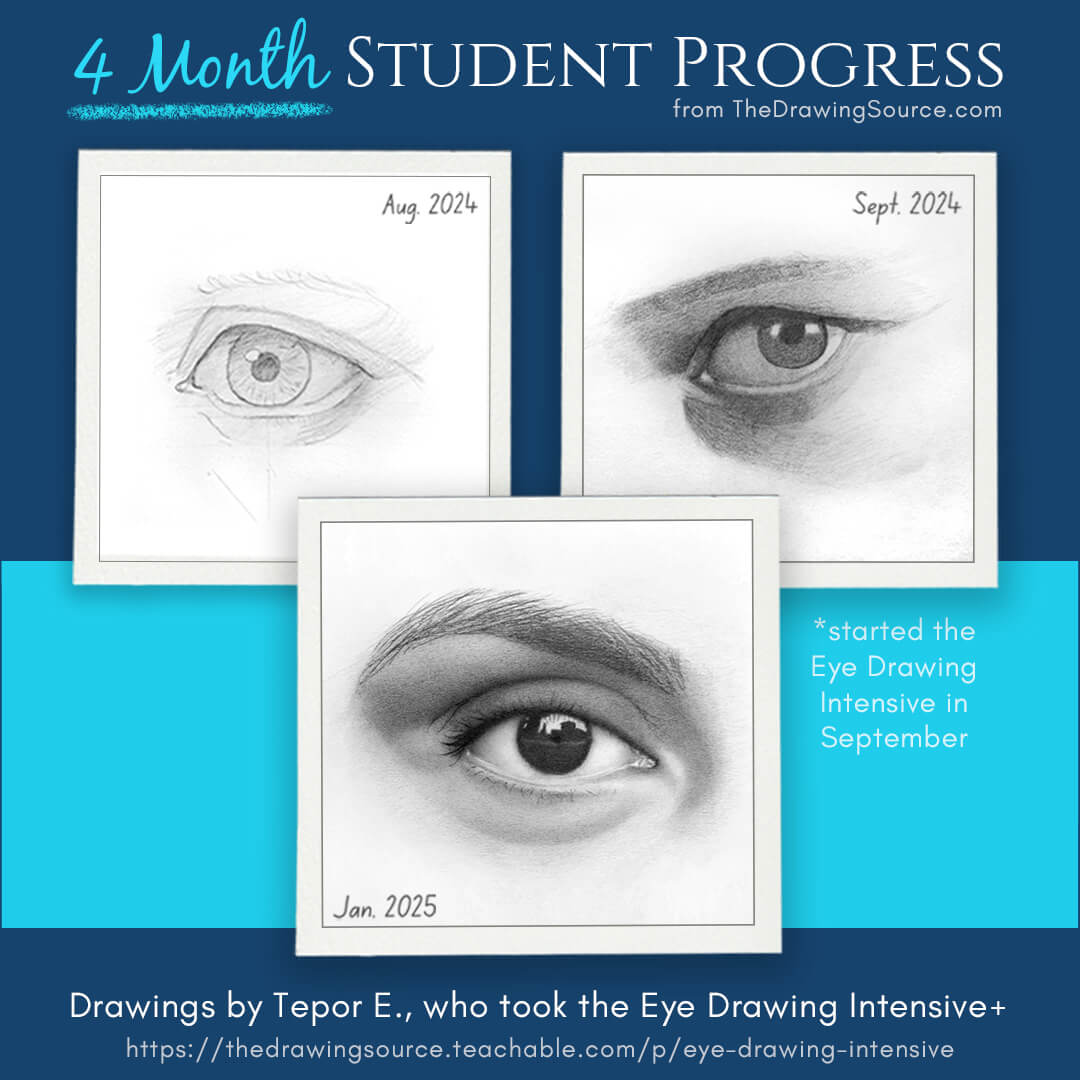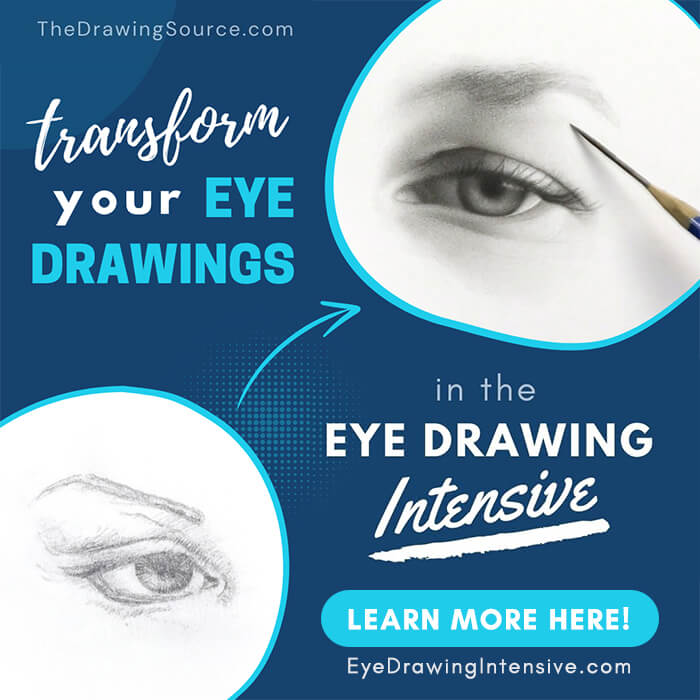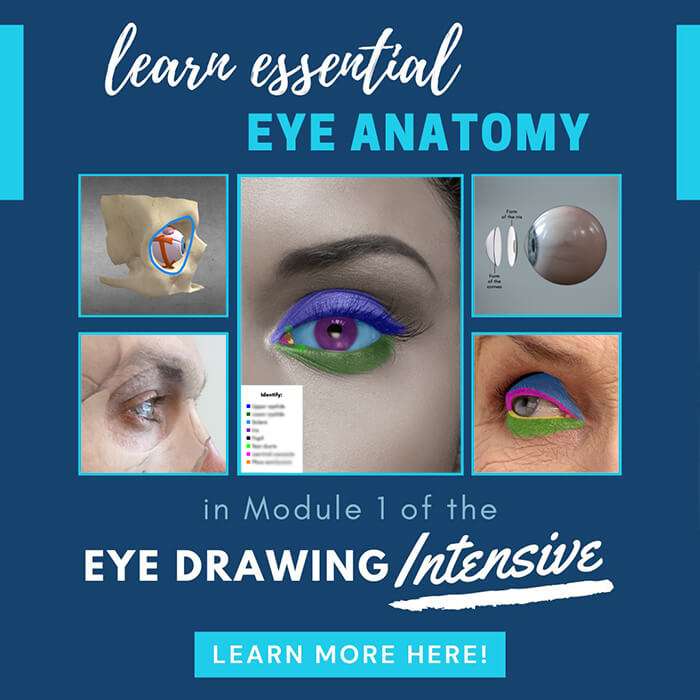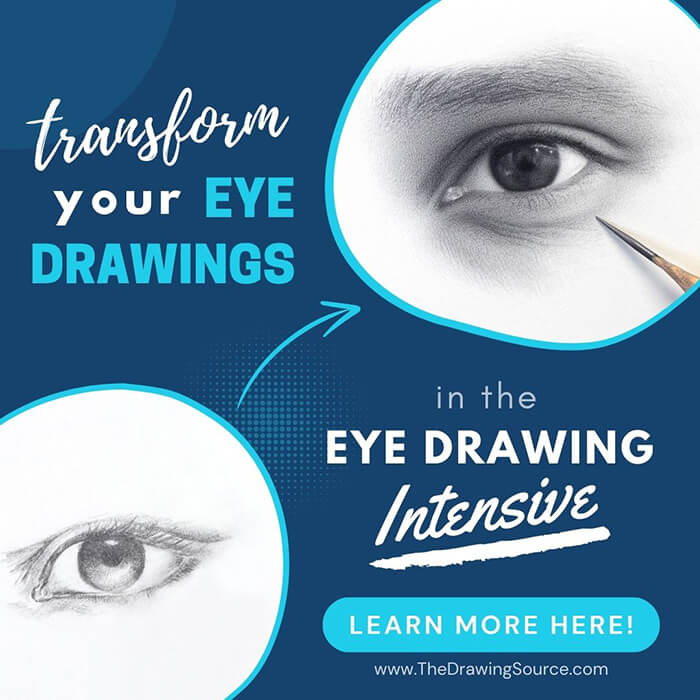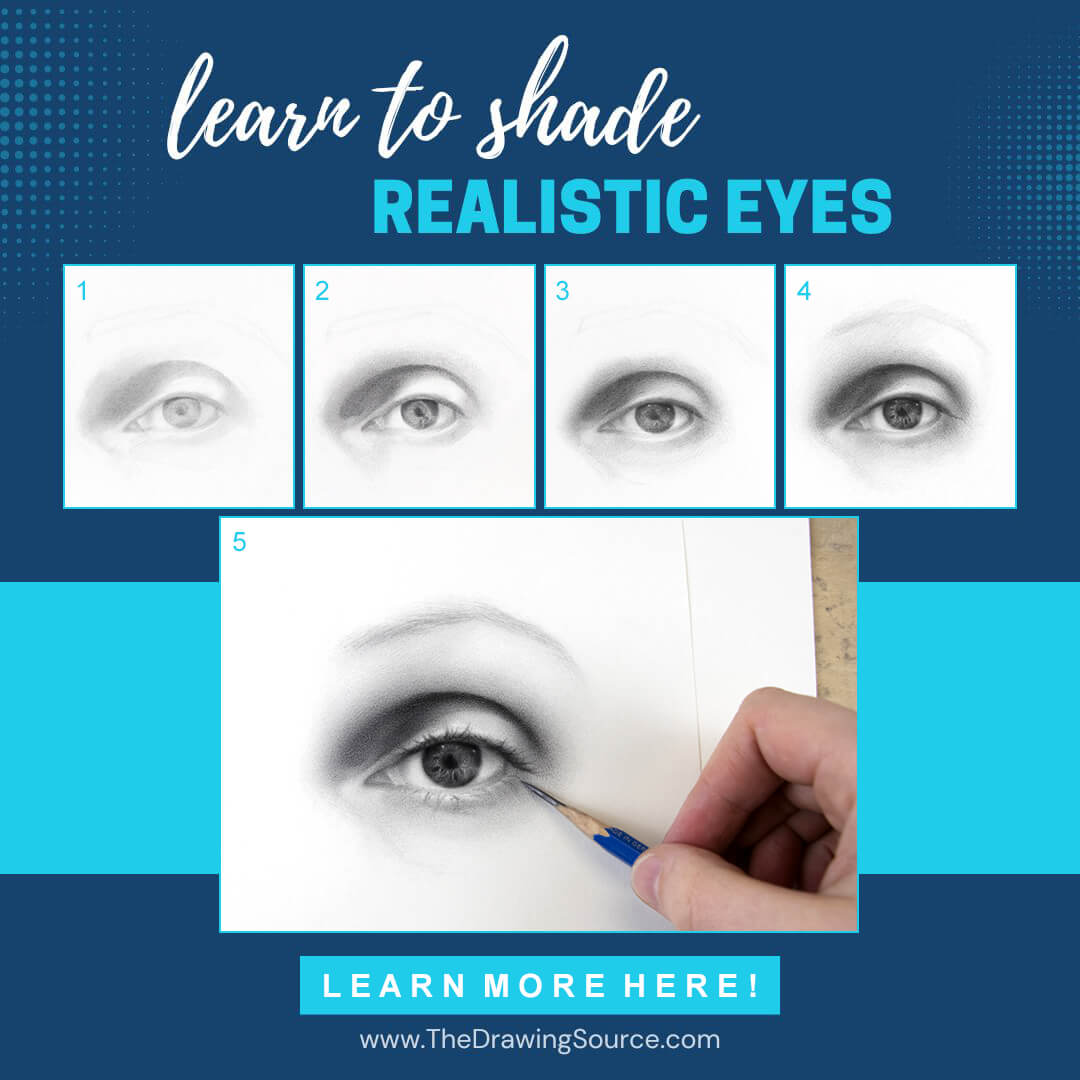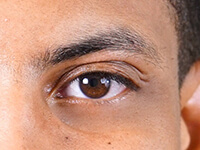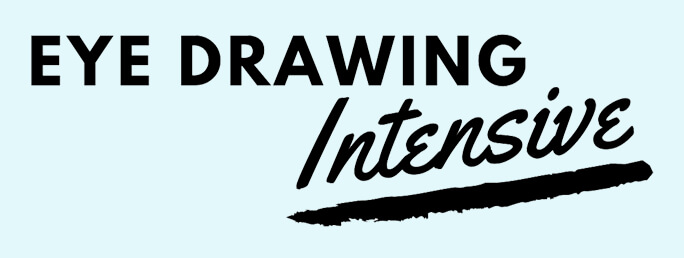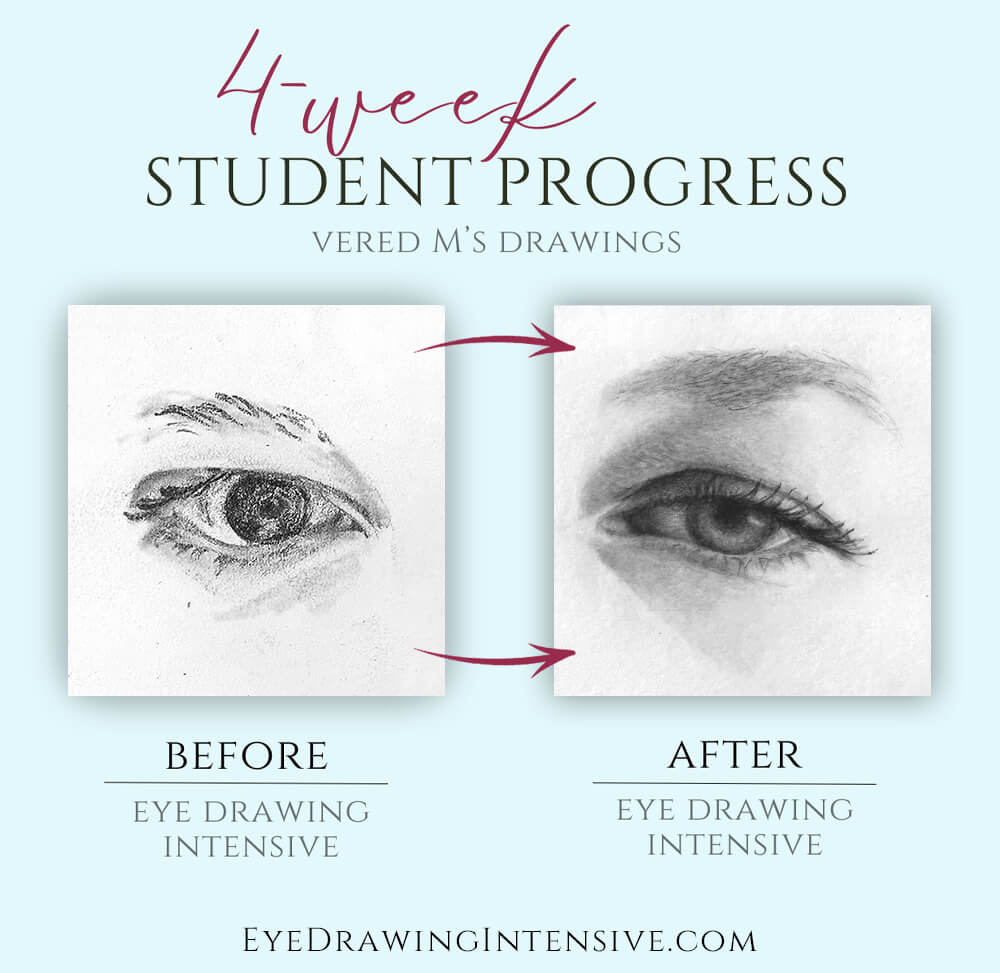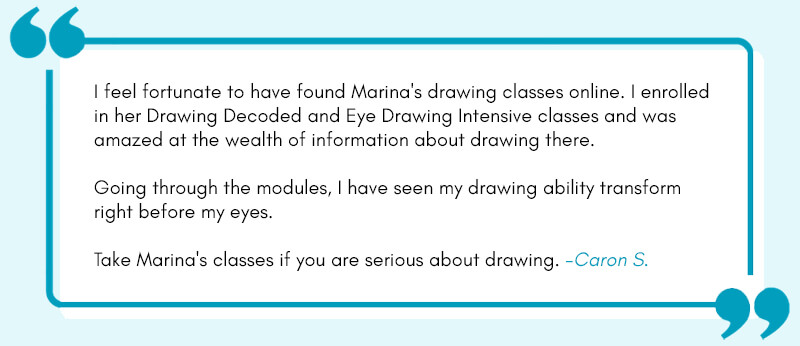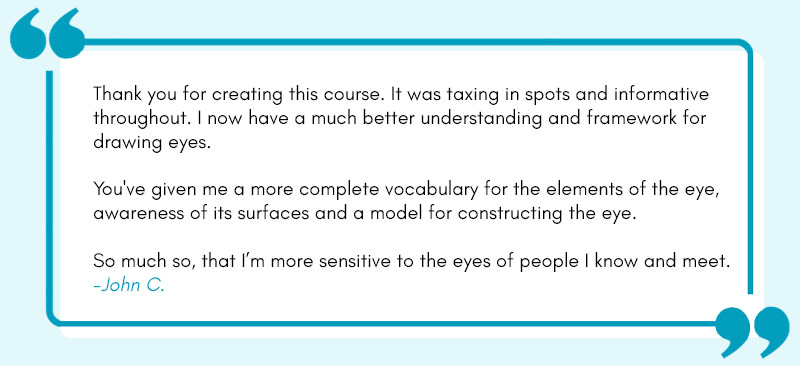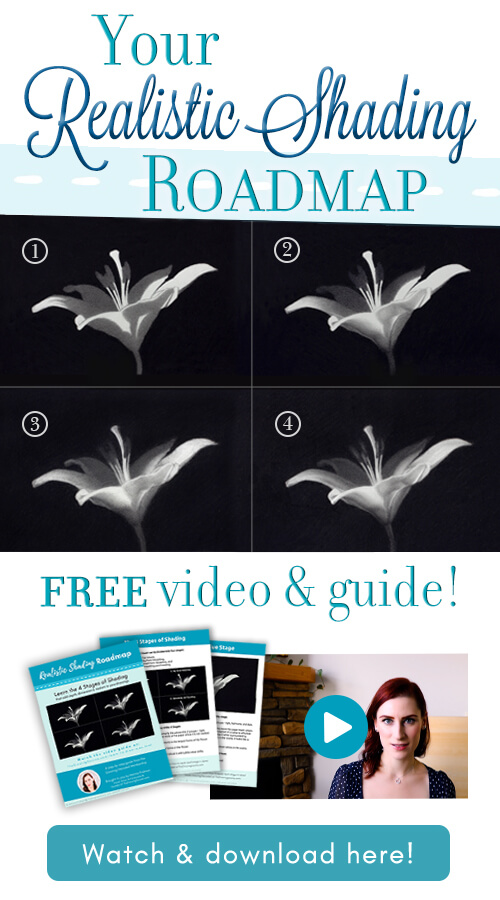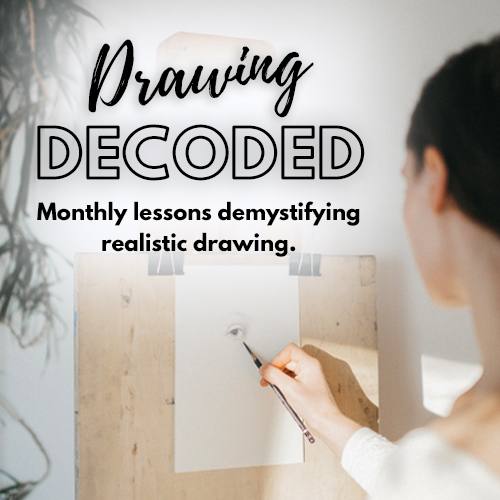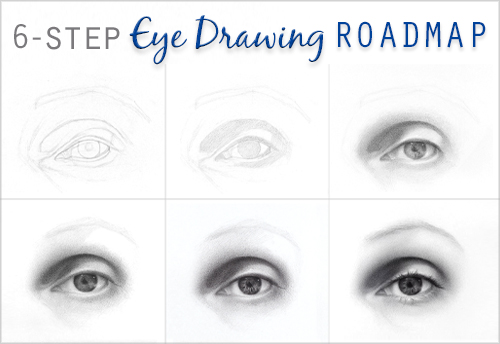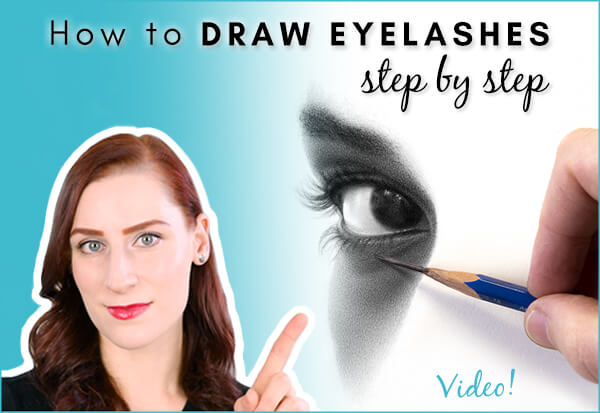- Home
- Portrait Drawing
- Eye Drawing Hub
- How to Draw Eyebrows
How to Draw Eyebrows
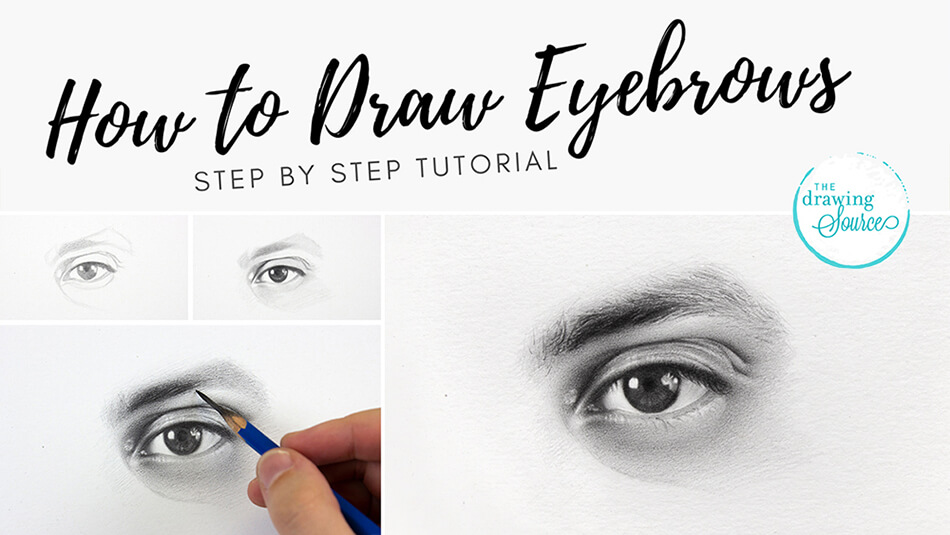
You've drawn an eye, it's going quite well, and now you're wondering how to draw eyebrows that they look believable, and add to your drawing rather than detract from it. You're in the right place! There are a few simple guidelines we can follow to learn how to draw eyebrows convincingly and
realistically.
Before you start, don't miss the free:
Draw Better Eyes Toolkit
Fix the most common mistakes making your eye drawings look flat and unrealistic with 6 short video lessons and the Eye Drawing Rescue Checklist. Get the Toolkit here!
The ‘trick’ to drawing eyebrows (or any challenging texture,
really) is to stop thinking of them as eyebrows, or even hair. Instead, for at least
the first half of the drawing process, we need to think of the eyebrows simply
as shapes and values.
This is a very important, but sometimes challenging, mindset shift! To help alter your perception and learn to view complex subjects as shapes and values, take my free Mini-Course, which features video lessons on these essential concepts.
Or dive into my Eye Drawing Intensive, where you can transform your eye drawings, and feel confident drawing eyes and eyebrows once and for all!
A F T E R T H I S L E S S O N:
Don't miss these free eye drawing resources:
- Draw Better Eyes Toolkit!
- The 6-Step Eye Drawing Process [Video Tutorial & Downloadable Guide]
- How to Draw Realistic Eyes [Step by Step Tutorial]
- How to Draw Eyelashes [Step by Step Video Tutorial]
- Most Common Eye Drawing Mistakes [Video Series]
And my in-depth course on drawing realistic, believable eyes:
Downloadable Resources
Get the reference photo of the eye I'm drawing here!
Get the eyebrow tutorial infographic here!
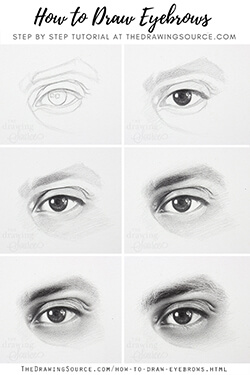
How to Draw (Realistic) Eyebrows
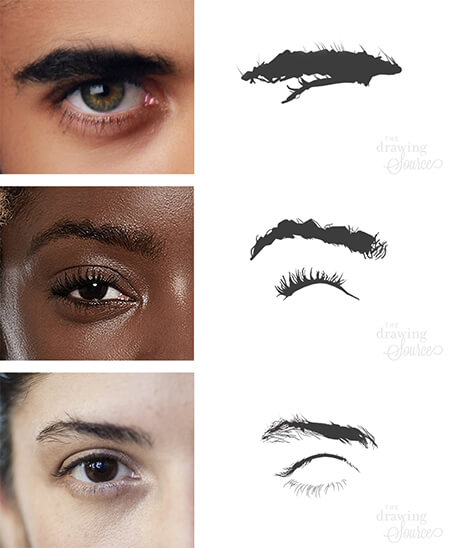
If I were to distill the process of drawing an eyebrow into three key points,
they would be:
- Work ‘from general to specific’. In the eyebrows above, notice that a large portion of each one can be massed or grouped into a fairly simple shape. That is exactly how I'll start my drawing: by initially simplifying and grouping the eyebrow into one or two basic shapes, and gradually working up to the specific details like individual hairs. Watch this video on Most Common Eye Drawing Mistakes to learn more about drawing convincing eyebrows and eyelashes!
- Look for similarities in the eyebrow. Once I have
established my basic shapes and proportions, I will start looking for more
specific groupings of similar eyebrow hairs: Where do they overlap? Where are they
similar in proximity, direction, angle, length or value?
- Look for variations in the eyebrow. Where are the hairs
distinctly different? Where do they change direction? Where are the most evident value shifts?
The balance of unity and variety (or similarity and difference) is one of the
cornerstones of composition, and we can make great use of it when drawing this
eyebrow.
Let’s jump right into the tutorial and expand upon these guidelines! Or, download the reference photo of the eye I'm drawing, an infographic of this tutorial (higher up on this page), and draw along with me.
I will be using Staedtler Mars Lumograph graphite pencils: HB, 2B and 4B.
How to Draw Eyebrows
Step 1:
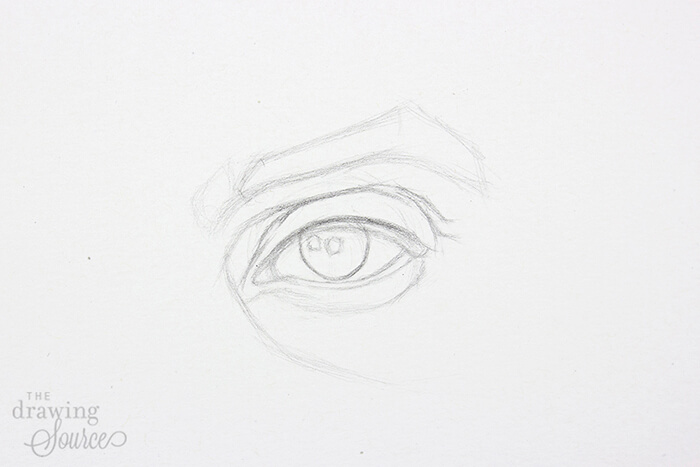
As with most drawings, I begin this one by blocking in the
basic, simplified shape or couple of shapes of the eyebrow using line. To
determine what the major groupings are, I can squint at the eyebrow, which
merges many of the details to create a more defined, solid shape. I also look for major
divisions, such as the one between shape A and shape B, which I indicate in my
line drawing.
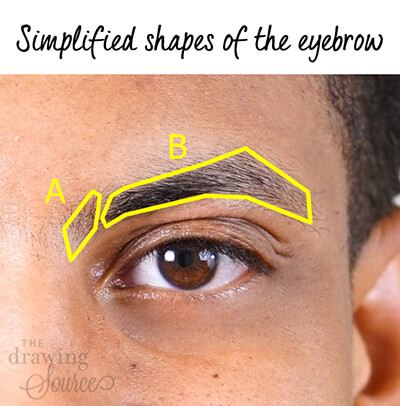
During this block-in stage, my priorities are:
- finding and indicating the major angle changes of the eyebrow
- drawing the correct proportions of the eyebrow, and
- establishing the correct alignment of the eyebrow with the eye itself.
I can do this by lining up my pencil with the peak of the
eyebrow, for example, and checking which part of the eye it aligns with (see the diagram below). Then,
I mimic this alignment in my drawing.
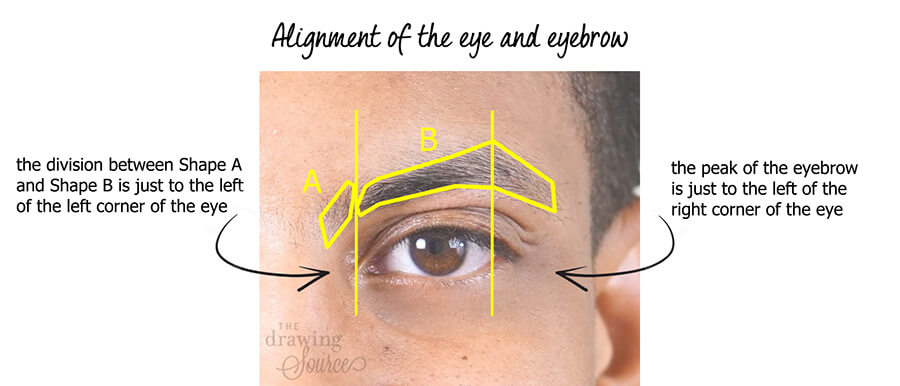
How to Draw Eyebrows
Step 2
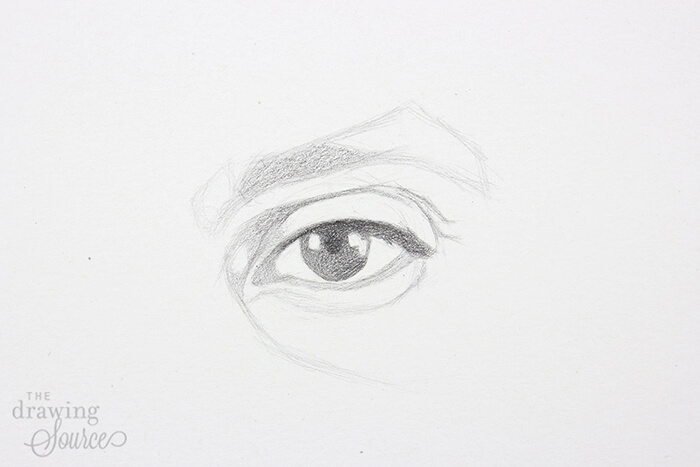
Though I will focus primarily on drawing the eyebrow in this tutorial,
because the eye and eyebrow are developed simultaneously, the two are
inextricably linked, and I will mention some of the eye-drawing steps
when they pertain to the eyebrow. View my step by step tutorial specifically
on drawing realistic eyes here.
In this step, I'm starting to look for the value structure of the eye and eyebrow: where are the light values, middle values, and dark values? (Watch Lesson 4 of my free Mini-Course to learn how to develop the value structure of your drawing!)
Specifically in the eyebrow, there is a dark shape within Shape B, which I’ll call Shape C (pictured below). This shape is one of the darkest areas in the entire scene. I’ve indicated Shape C on my drawing using a slightly darker value.
I prefer to build up my values gradually: because dark values
are difficult (and sometimes impossible) to erase, I want to be quite certain that everything is in
the right place before I commit to fully darkening them.
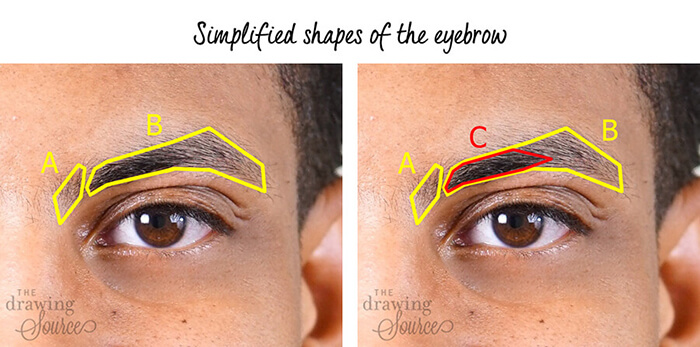
(One of the most common eye drawing mistakes is not simplifying the eyebrows and eyelashes. I cover this mistake, and how to fix or avoid it, in Part 3 of my Most Common Eye Drawing Mistakes video series here!)
How to Draw Eyebrows
Step 3
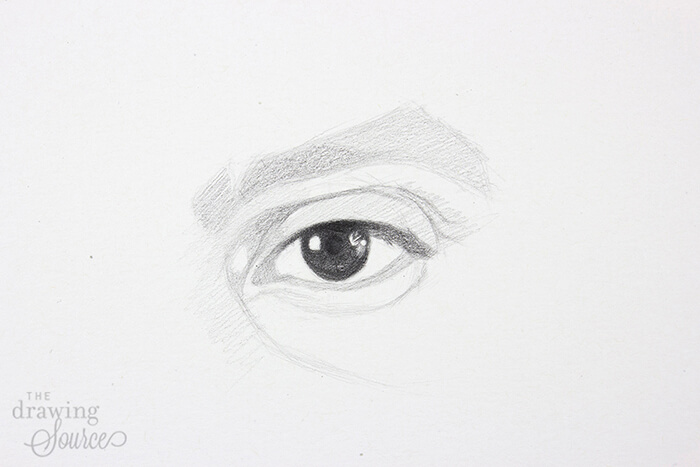
I have filled in the rest of the eyebrow with a light value,
leaving a slight value difference between the darker shape and lighter
shapes.
Notice that I am not at all concerned with drawing ‘hair’ yet!
A key to drawing realistic eyebrows is not to get caught
up in drawing every single hair. Instead, we need to ‘see through’ these
details, initially ignoring them as much as possible, and instead paying attention
to shapes of values.
Though the pupil and iris of the eye are not completely finished, I focused on rendering them so as to have a variable that I am confident and certain in, and can now compare the rest of my
proportions, values, and placement to.
How to Draw Eyebrows
Step 4
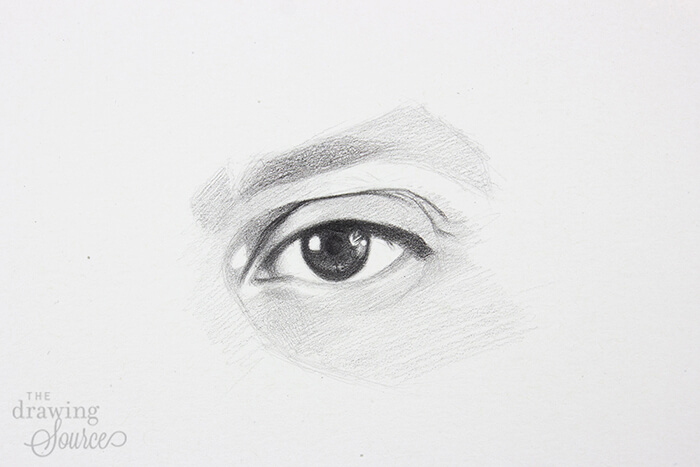
Here I’m beginning to establish the ‘value extremes’ in my
drawing: the lightest and darkest values in the scene (pictured below).
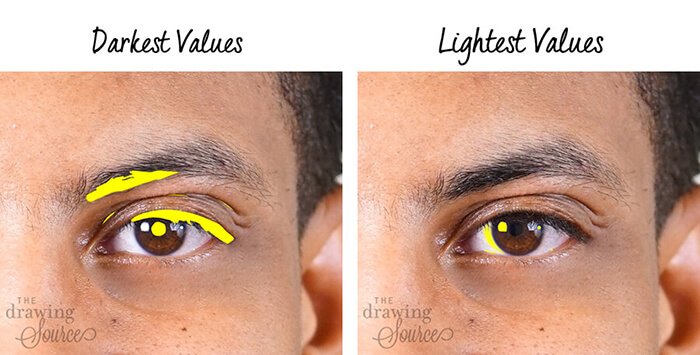
How to Draw Eyebrows
Step 5
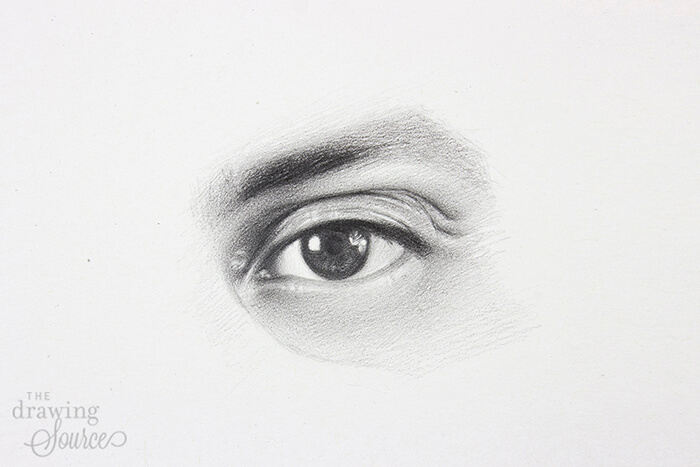
Notice that the eyebrow is already starting to resemble
hair even though I haven’t drawn any individual hairs! Here I've darkened the eyebrow, particularly the
dark shape that I named 'shape C' earlier. The subtle pencil marks I applied are already
starting to ‘read’ as hair, simply because I applied them in the direction of the hair. However, I am still only looking for shapes of value.
How to Draw Eyebrows
Step 6
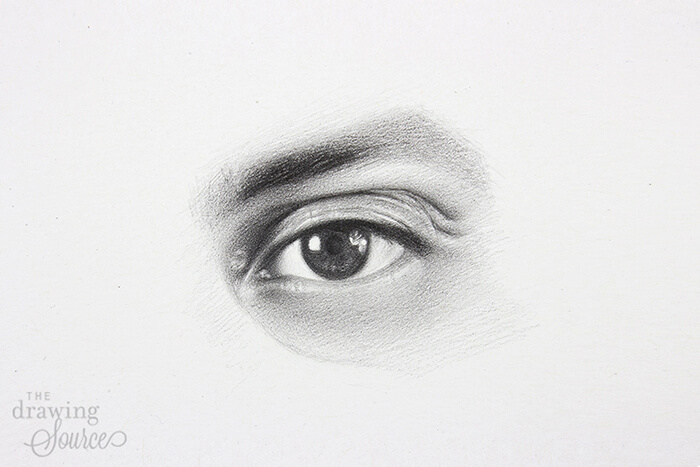
I have further darkened and defined the dark shape of the eyebrow,
and have started ‘turning’ the smaller forms of the eye, such as the folds in the
upper eyelid, and the subtle gradations in the lower eyelid.
Notice that the edges of the eyebrow are still fairly soft. (To learn about the essential concept of Edges, watch Lesson 6 of my free Mini-Course!)
Now that I have massed in as much of the eyebrow as I can, and built up a range of middle values in the eye, I am finally ready to turn my attention to some of the individual hairs in the eyebrow.
Am I going to draw every single one of them? Not at all! Personally, I am not interested in a hyper-realistic representation here. I prefer a more naturalistic look, and can achieve this by selectively choosing which eyebrow hairs to indicate.
To make my decision, I look for:
- Changes in the direction of the eyebrow hair, and where these changes of direction are most noticeable
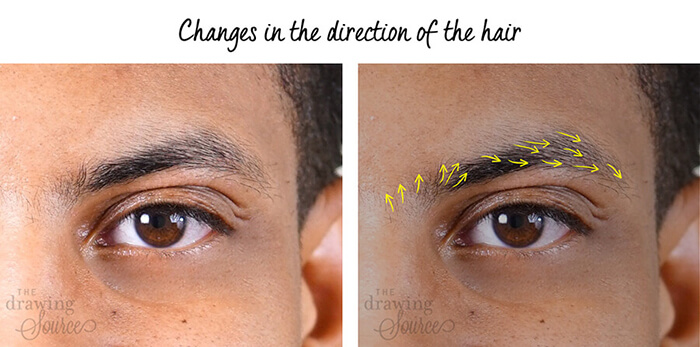
- Which hairs are most prominent? (Many of the arrows below are similar to the ones above because the most prominent hairs show the changes in direction most evidently!)
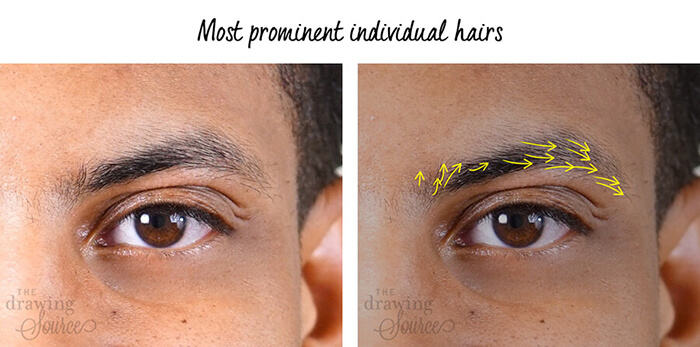
- Groupings of hairs that I can indicate (they can be 'grouped' based on their proximity to each other, or by their similar direction)
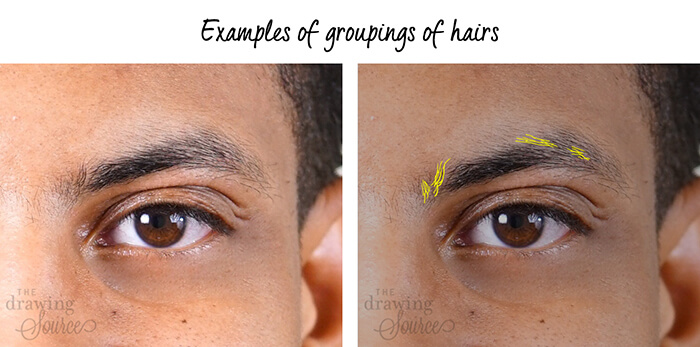
How to Draw Eyebrows
Step 7
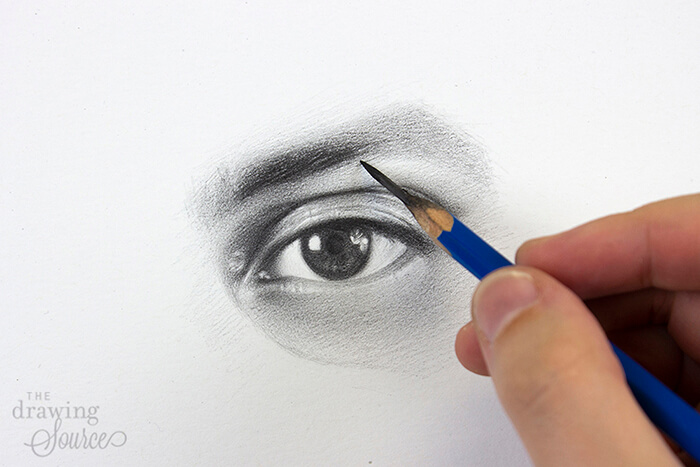
Once my analysis is complete, I start drawing in some of
these individual hairs, paying close attention to their spacing, thickness, and
length. They are not equally spaced or the same size! To create
a likeness of our model, we must pay attention to the specifics of this particular
eyebrow. As soon as a few of my marks start to look the same in length or
spacing, I know it’s time to look more closely at my model or my reference
photo, whichever I am drawing from.
How to Draw Eyebrows
Step 8
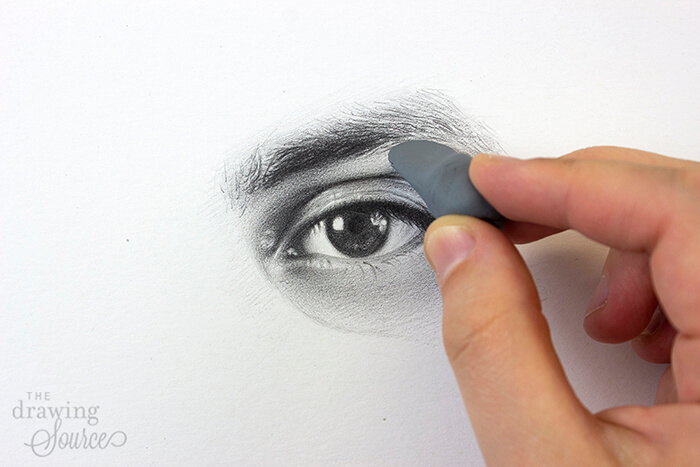
I am using my pencil and kneaded eraser almost equally
during this step. In particular, I lean heavily on the second technique that I
demonstrate in my kneaded eraser technique video: flattening the kneaded eraser to give it
a sharp edge, and then using it to create some of the lighter separations
between the hairs that can be seen in the reference photo.
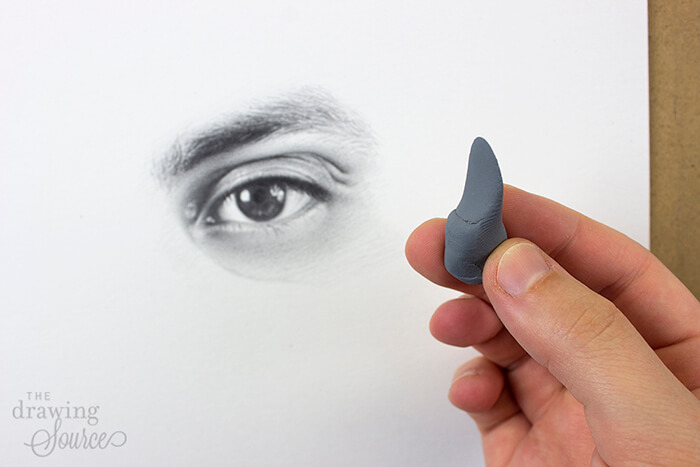 Flattened, sharp edge of the kneaded eraser
Flattened, sharp edge of the kneaded eraser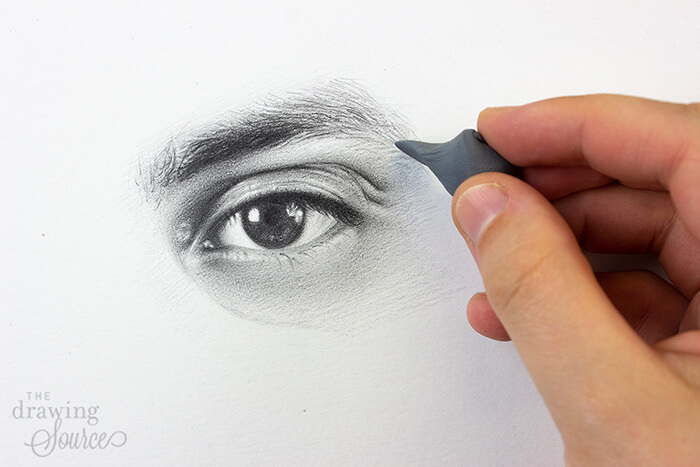
The Finished Drawing
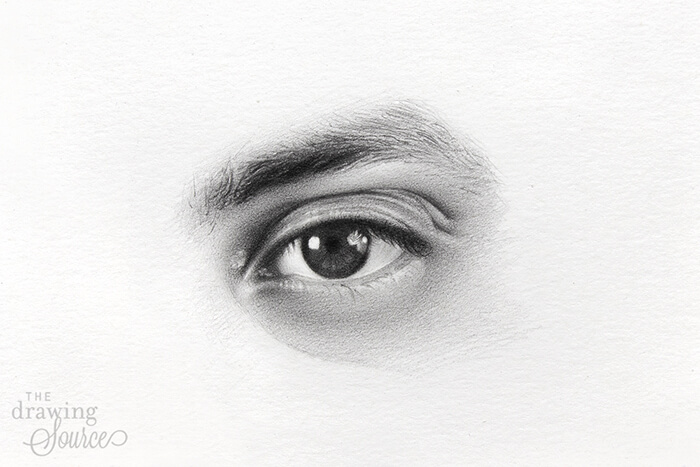
Is my finished drawing an exact replica of my model's eye and eyebrow? I'm sure that it's not! However, the likeness and character of this individual's particular eyebrow is there, and that was certainly the goal!
Notice:
- All of the unruly hairs that I indicated to add vitality and life to the drawing, as opposed to depicting them unrealistically evenly and facing the same direction.
- That I selectively darkened some of the individual hairs and left others rather light. This kind of variation can add interest and realism to a drawing.
- That there are no sharp edges along the top ridge of the eyebrow. When drawing any kind of hair, squint at the subject to determine where the sharpest and softest edges are in order to create a realistic illusion! (Learn about Edges in Lesson 6 of my free Mini-Course).
This concludes the tutorial, but don't miss these ...
Next Steps
1) Quickly improve your eye drawings with the Draw Better Eyes Toolkit here!
2) Download the free resources below:
The best way to improve your eye drawings is, unsurprisingly, to practice. Why not download a reference photo of the eye from this tutorial, the infographic to remind you of the steps, and start learning how to draw realistic eyes today.
Downloadable Resources
3) Ready to transform your eye drawings? Learn more about my Eye Drawing Intensive:
Happy Drawing,
Enjoyed this page? Please share it!
Share buttons and pinnable image below:
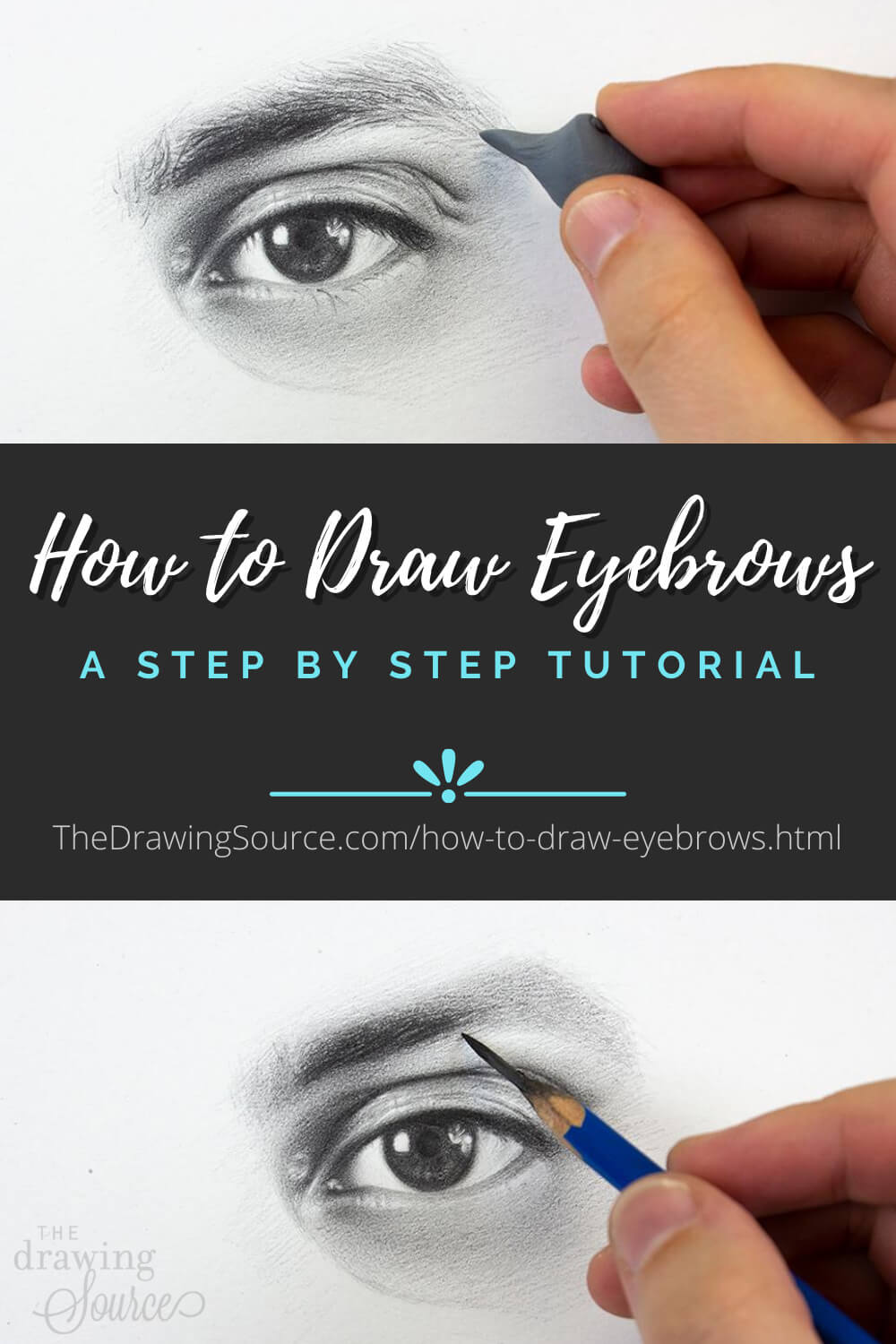
If you enjoyed this tutorial on how to draw eyebrows, you may also enjoy ...
Related Pages:
The 6-Step Eye Drawing Process [Video Tutorial & Downloadable Guide]
How to Draw Realistic Eyes [Step by Step Tutorial]
How to Draw Realistic Eyelashes [Step by Step Video Tutorial]
Most Common Eye Drawing Mistakes [Video Series]
Return from How to Draw Eyebrows to:
Eye Drawing Hub | Portrait Drawing | Drawing Tutorials | Home
